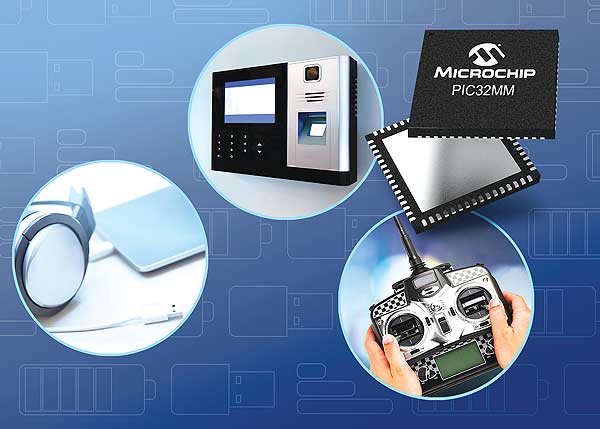 Microchip announces new PIC32MM “GPM” microcontrollers (MCUs). These eXtreme Low Power (XLP) MCUs feature large memory in small packages to provide ample battery life for space-constrained applications. With the inclusion of several connectivity options, Core Independent Peripherals and feature-rich development boards, the “GPM” MCUs are well suited for digital audio applications, gaming/entertainment devices, IoT sensor nodes and portable medical devices.
Microchip announces new PIC32MM “GPM” microcontrollers (MCUs). These eXtreme Low Power (XLP) MCUs feature large memory in small packages to provide ample battery life for space-constrained applications. With the inclusion of several connectivity options, Core Independent Peripherals and feature-rich development boards, the “GPM” MCUs are well suited for digital audio applications, gaming/entertainment devices, IoT sensor nodes and portable medical devices.
The XLP PIC32MM “GPM” family of MCUs enables developers to minimise power consumption, board space and development time. The devices provide power-saving options, such as sleep modes with current consumption as low as 650 nA with Random Access Memory (RAM) retention, to greatly extend battery life in portable applications. These PIC® MCUs are available with up to 256 KB of Error Correction Code (ECC) Flash and 32 KB of RAM, providing ample space for application code and communication stacks. The new devices are available in a variety of pin-count options ranging from 28 to 64 pins in compact packages, as small as 4×4 mm with 28 pins; 5×5 mm with 36 pins; and 6×6 mm with 48 pins to optimise the overall design footprint.
The PIC32MM “GPM” family integrates Core Independent Peripherals (CIPs), such as Direct Memory Access (DMA), Configurable Logic Cells (CLC) and a 12-bit Analogue-to-Digital Converter (ADC). These allow the system to accomplish tasks in hardware while freeing-up the Central Processing Unit (CPU) to do other tasks or to go to sleep. Leveraging these hardware-based CIPs improves execution efficiency while maintaining system flexibility and lowering overall power consumption.
These MCUs also include a crystal-less USB device/host/On-the-Go (OTG) and I2S functionality, crucial for USB audio applications and communication gateways. This family’s accurate on-chip USB oscillator eliminates the need for an external crystal or oscillator reducing overall system BOM cost and board real-estate associated with USB applications. The new family of devices is supported by the MPLAB® Code Configurator (MCC) tool. MCC makes it easy to configure the USB stack, pin assignments and peripherals, significantly accelerating development time. These MCUs are also supported by Microchip’s MPLAB X Integrated Development Environment (IDE) ecosystem and XC32 Compiler. The new PIC32MM USB Curiosity Development Board is a low-cost development platform that comes fully integrated with a programmer/debugger. The board also features two MikroElektronika mikroBUS™ interfaces that enable support for more than 300 click boards™, a USB Micro B connector and two X32 interfaces that enable access to the PIC32 Audio Codec Daughter Card.
Microchip Technology | www.microchip.com


